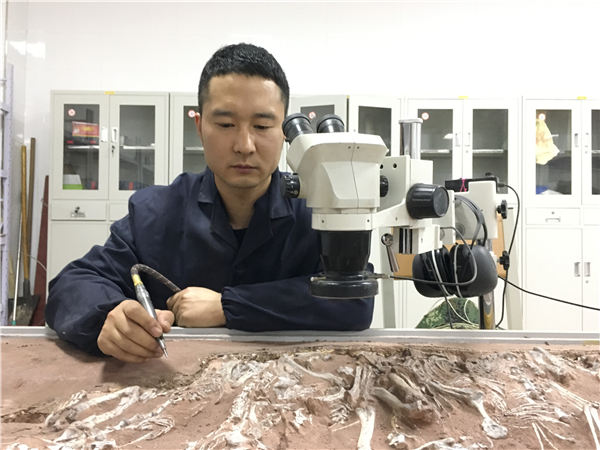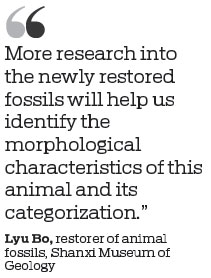 |
|
Lyu Bo restores animal fossils at the Shanxi Museum of Geology. [Photo by Sun Ruisheng/China Daily] |
A young fossil restorer at a Shanxi museum spent three years helping to identify an extinct species, Wang Ru and Sun Ruisheng report.
A man is working in a basement without windows amid a lot of noise and white dust on his table.
Lyu Bo, 32, is a restorer of animal fossils at the Shanxi Museum of Geology in North China's Shanxi province.
According to him, Wangisuchus tzeyi lived in the middle Triassic period (around 240 million years ago), and is thought to be older than crocodiles or even dinosaurs. The extinct animal from the archosauriformes reptile group was named by Chinese paleontologist Yang Zhongjian as Wangisuchus tzeyi in 1964, on the basis of fossilized fragments of jaw bones.
The genus is named after late Chinese archaeologist Wang Zeyi, who first discovered the fossil in the 1950s.
Some experts even doubted the existence of such an animal due to the lack of identification material.
But at a news conference held by the museum in Taiyuan, the provincial capital of Shanxi, last year, the research results of paleontological studies were announced, and the fossils of Wangisuchus tzeyi were shown for the first time. Lyu has been involved in the restoration of these same fossils for the past three years.
"More research into the newly restored fossils will help us identify the morphological characteristics of this animal and its categorization," Lyu says.
"They are the clearest and the most complete Wangisuchus tzeyi fossils we have yet found."
The Shanxi Museum of Geology had collected fossils in the province's Yushe county in 2010, including one of an unidentified headless animal, and another containing 11 other similar animals that were fully intact. Lyu began to restore the fossils in 2015, and after three years the museum worked with the Canadian Museum of Nature to identify the fossils as those of Wangisuchus tzeyi.
"The fossils were found among giant rocks, and required close observation to know which layer the fossils were in," says Lyu.
"In my work, any carelessness can lead to the destruction of the fossils. So I was extremely attentive," he adds.
After he had cleaned out some 30 centimeters of extra rock, he was very close to the fossils. He then used a hard needle to continue his work under the microscope.
"Sometimes I could only repair 1 square centimeter of the fossils in an entire day," he says, adding that on some days he felt dizzy, or his waist and back began to hurt after long hours of work.
Moreover, since the rocks that contained the fossils were large, Lyu could only work in a basement or an outdoor shed where it was stuffy and damp in summer, and cold in winter. He used carving pens connected to air pumps as one of his main tools. But the pumps were noisy and the pens made a piercing sound and produced a lot of dust.
Lyu says he was encouraged by Tang Zhilu, an expert at the Institute of Vertebrate Paleontology and Paleoanthropology in Beijing, when he met with difficulties during the fossil restoration.

"Tang told me to persist since it was my craftsmanship and willpower that were being tested, instead of my techniques."
Lyu says he feels a sense of satisfaction when the animals "come alive after being repaired".
After painstaking work, revealing the skulls or teeth of animal offers Lyu a sense of rebirth.
Lyu's first son was born last year just after he had finished restoring the Wangisuchus tzeyi fossils.
A graduate of the Shanxi Agricultural University, with a major in the management of agricultural and forestry economy, Lyu was recruited by the museum in 2012. He was initially bored while sitting there restoring fossils amid the noise and dust. But with time he began to feel a sense of achievement. He has already worked on restoring a large number of fossils.
He finds it worthwhile spending years on them since "fossils have been buried for millions of years or even more, but through my work, they can now be shown to the public".
Lyu says there are only about 200 people in the same profession around the country.
"Only a few people insist on doing this since it's quite monotonous, and you have to work in an undesirable environment.
"This job requires you to work by obeying the dictates of your conscience. You can do it carelessly, but given that it has been difficult for us to discover and dig out the fossils, you need to do the repair work as perfectly as you can."
Contact the writers at wangru1@chinadaily.com.cn
(China Daily 03/18/2019 page14)